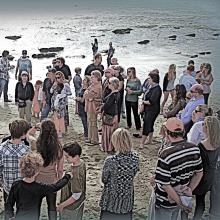Gabby Giffords
There is a tradition in the black church named “call and response.” It’s simply the experience of the preacher “calling” and the congregation “responding.” I’ve always loved it. When you’re preaching in a black church, and the congregants begin to actively and vocally respond, your sermon can actually get better, stronger, deeper, and more powerful than it might have been if everyone just sat there. Sermons get interactive. Congregations can be inspired by the preacher — and the other way around. Ideas grow, get taken further, and even develop during and after the sermon. And it can make things change.
After his first year in office, I sent a letter to President Barack Obama humbly suggesting he needed “the political equivalent of the black church’s call and response.” Just talking to and in Washington was never going to get important things done. Washington just sits there and mostly makes sure that things don’t change — and that the special interests that buy, shape, and control this city usually have their way. (That private letter to the president will be published for the first time in my new book about the common good coming out in April.)
I recalled something Obama said right after the 2008 election — that he would need “the wind of a movement at my back” to get anything really important done. He would have to go over the heads of Washington, to speak directly to the people that had elected him and also those who didn’t. He would have to have public debates about the common good and not just debate in Washington.
I saw him do that in this week’s State of the Union speech.
Justice Groups Start Work On 'Common Good' Platform For 2012 Election; The 5 Biggest Failures Of The 112th Congress; An AIDS-Free Generation; At Occupy LA Eviction, Police Restrict Media CoverageThousands Of Immigrant Kids Ask Obama To Stop Deportations; Evangelism And Environmentalism: A Time To Act (OPINION); When Rehab Is Cut -- You Hurt Too.
To me, "unexpected" is at the heart of how I understand grace. It is the unearnable gift, the divine reversal and sacred surprise, the still small voice that drowns out the din of the maddening crowd, the little bit extra that my Cajun friends call lagniappe, the very thing we "deserve" the least but get anyway. From God. From the One who created the world and the audacious, indescribably power of love.
Taking a cue from Nell, here are just a few of the unexpected blessings I am grateful for today:
For God's fingerprints that cover every inch of our world, seen and unseen. And for the moments where I can almost make out the holy whirls imprinted in the sky, the ocean, the sunlight, and on the faces and stories of each of us.
For the generosity and selflessness I see so vividly — all around me, all the time — even in these lean, nervous days. I saw it in Zuccotti Park, where strangers prepared and served food to other strangers. I saw it in the sober faces and strong arms of the men who helped 84-year-old Dorli Rainey to safety after she was pepper-sprayed at an Occupy rally in Seattle. I heard it in the prayers lifted at the White House, at North Park University in Chicago, and in the basement of a church in Spanish Harlem where kind, mighty souls formed Human Circles of Protection last week and stood in solidarity with the poor, the vulnerable, and the least of those among us. I watched it on display at border crossings, immigration rallies, refugee camps in the Horn of Africa, and at a glass blower's studio in my hometown of Laguna Beach where strangers arrived with shovels and wheelbarrows to help dig out an artist and his artwork from the muddy ravages of a flash flood. I saw it in the fresh coat of paint on the front steps of my elderly parents' home in Connecticut that my cousins had applied for them with great care and kindness when my brother and I couldn't be there to do it.


